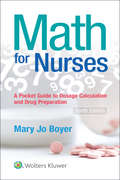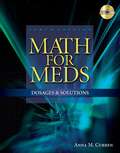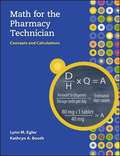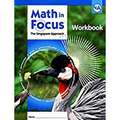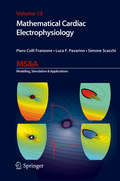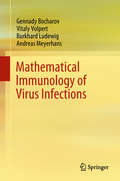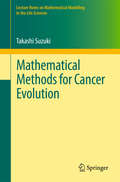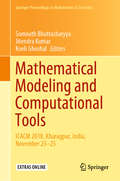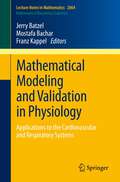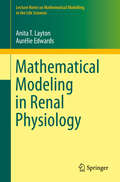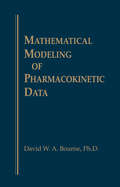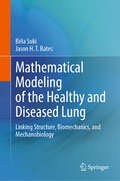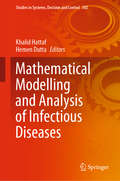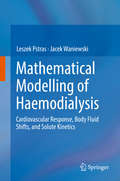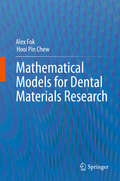- Table View
- List View
Math For Nurses: A Pocket Guide to Dosage Calculations and Drug Preparation
by Mary Jo BoyerQuickly Access Everything You Need to Calculate Dosages Effectively and Ensure Accurate Drug Delivery Current, compact and easy to use, Math for Nurses helps you perfect the basic math skills, measurement systems and drug calculations/preparations essential to successful nursing practice. Packed with real clinical examples and practice problems, this pocket-sized reference guides you step-by-step through the problem-solving and practical applications required in the nursing workplace. A handy pull-out quick reference card delivers fast access to basic equivalents, conversion factors and math formulas. Comprehensive dosage calculation coverage familiarizes you with ratio, proportion, formula and dimensional analysis methods of arriving at calculations. Practice problems throughout the text and review questions at the end of each chapter and unit test your retention and application capabilities. 300 additional Practice Problems and Answers available online through thePoint further enhance learning and retention. Learning Objectives focus your study and review on essential concepts and practices. Critical Thinking Checks help you analyze your results to dosage problems and ensure understanding of key content.
Math for Meds: Dosages and Solutions (10th Edition)
by Anna M. CurrenIncrease your confidence and aptitude in dosage calculations with the best-selling ratio and proportion book on the market! Learn from the master, Anna Curren, who has successfully taught dosage calculations to thousands of students. This new edition of Math for Meds includes full-color drug labels and syringes throughout, which are tied to questions that test your understanding and mastery of the concepts. With the goal of helping you become a safe and effective practitioner, Math for Meds walks you through basic and advanced calculations in detail, including intravenous and pediatric calculations.
Math for the Pharmacy Technician: Concepts and Calculations
by Kathryn A. Booth Lynn M. EglerRecognizing the enormous need for well-trained pharmacy technicians as well as the serious need to decrease medication errors, we have developed Math for Pharmacy Technicians: Concepts and Calculations. This textbook is organized from simple to complex and walks the student through the necessary information to pass the math portion of the Pharmacy Technician Certification Board (PTCB) exam. More important, we have created pharmacy technician-specific information that is nonthreatening and will help the student learn to safely practice as a pharmacy technician. This text is organized into 11 chapters, along with a pretest and a comprehensive evaluation, or post test.
Math in FocusTM: The Singapore Approach, Workbook, 1B
by Fong Ho Kheong Chelvi Ramakrishnan Michelle ChooNIMAC-sourced textbook
Math in FocusTM: The Singapore Approach, Workbook, 3B
by Fong Ho Kheong Chelvi Ramakrishnan Michelle ChooNIMAC-sourced textbook
Math in FocusTM: The Singapore Approach, Workbook, 4A
by Fong Ho Kheong Chelvi Ramakrishnan Gan Kee SoonNIMAC-sourced textbook
Mathematica for Bioinformatics: A Wolfram Language Approach To Omics
by George MiasThis book offers a comprehensive introduction to using Mathematica and the Wolfram Language for Bioinformatics. The chapters build gradually from basic concepts and the introduction of the Wolfram Language and coding paradigms in Mathematica, to detailed worked examples derived from typical research applications using Wolfram Language code. The coding examples range from basic sequence analysis, accessing genomic databases, differential gene expression, and machine learning implementations to time series analysis of longitudinal omics experiments, multi-omics integration and building dynamic interactive bioinformatics tools using the Wolfram Language. The topics address the daily bioinformatics needs of a broad audience: experimental users looking to understand and visualize their data, beginner bioinformaticians acquiring coding expertise in providing biological research solutions, and practicing expert bioinformaticians working on omics who wish to expand their toolset to include the Wolfram Language.
Mathematical Analysis and Applications in Biological Phenomena through Modelling: ICMAAM-2023, Kolkata, India, October 9–11 (Springer Proceedings in Mathematics & Statistics #478)
by Priti Kumar Roy Arindam Bhattacharya Xianbing Cao Xue-Zhi LiThis volume presents a comprehensive compilation of chapters whose topics were presented at the 2nd International Conference on Mathematical Analysis and Application in Modeling (CMAAM-2023), held at the Department of Mathematics & the Center for Mathematical Biology and Ecology, Jadavpur University, Kolkata, West Bengal, India, from 9–11 October 2023. It encompasses groundbreaking research on cutting-edge developments across various branches of mathematics and its applications in diverse disciplines. In the realm of epidemiology, the book delves into the utilization of advanced tools such as fractional calculus, optimal control therapy and impulse therapeutic approaches. These tools, integrated with mathematical models, offer innovative solutions for managing various diseases and optimizing drug dose regimens. Beyond the scope of epidemiology, the book also incorporates chapters elucidating fundamental concepts in pure mathematics. These include explorations of topological phenomena and diverse algebraic concepts. This dual focus on applied mathematics and pure mathematical principles enhances the book's usability, catering to a broad audience of researchers and scholars. The book primarily targets young researchers engaged in the specified areas of study. By bridging the gap between theoretical mathematics and real-world applications, it serves a valuable resource, providing insights and methodologies that contribute to advancements in research and application across multiple disciplines.
Mathematical Cardiac Electrophysiology
by Piero Colli Franzone Luca Franco Pavarino Simone ScacchiThis book covers the main mathematical and numerical models in computational electrocardiology, ranging from microscopic membrane models of cardiac ionic channels to macroscopic bidomain, monodomain, eikonal models and cardiac source representations. These advanced multiscale and nonlinear models describe the cardiac bioelectrical activity from the cell level to the body surface and are employed in both the direct and inverse problems of electrocardiology. The book also covers advanced numerical techniques needed to efficiently carry out large-scale cardiac simulations, including time and space discretizations, decoupling and operator splitting techniques, parallel finite element solvers. These techniques are employed in 3D cardiac simulations illustrating the excitation mechanisms, the anisotropic effects on excitation and repolarization wavefronts, the morphology of electrograms in normal and pathological tissue and some reentry phenomena. The overall aim of the book is to present rigorously the mathematical and numerical foundations of computational electrocardiology, illustrating the current research developments in this fast-growing field lying at the intersection of mathematical physiology, bioengineering and computational biomedicine. This book is addressed to graduate student and researchers in the field of applied mathematics, scientific computing, bioengineering, electrophysiology and cardiology.
Mathematical Foundations and Applications of Graph Entropy
by Matthias Dehmer Frank Emmert-Streib Xueliang Li Yongtang Shi Zengqiang ChenThis latest addition to the successful Network Biology series presents current methods for determining the entropy of networks, making it the first to cover the recently established Quantitative Graph Theory. An excellent international team of editors and contributors provides an up-to-date outlook for the field, covering a broad range of graph entropy-related concepts and methods. The topics range from analyzing mathematical properties of methods right up to applying them in real-life areas. Filling a gap in the contemporary literature this is an invaluable reference for a number of disciplines, including mathematicians, computer scientists, computational biologists, and structural chemists.
Mathematical Foundations and Biomechanics of the Digestive System
by Roustem N. Miftahof Hong Gil NamMathematical modelling of physiological systems promises to advance our understanding of complex biological phenomena and pathophysiology of diseases. In this book, the authors adopt a mathematical approach to characterize and explain the functioning of the gastrointestinal system. Using the mathematical foundations of thin shell theory, the authors patiently and comprehensively guide the reader through the fundamental theoretical concepts, via step-by-step derivations and mathematical exercises, from basic theory to complex physiological models. Applications to nonlinear problems related to the biomechanics of abdominal viscera and the theoretical limitations are discussed. Special attention is given to questions of complex geometry of organs, effects of boundary conditions on pellet propulsion, as well as to clinical conditions, e.g. functional dyspepsia, intestinal dysrhythmias and the effect of drugs to treat motility disorders. With end of chapter problems, this book is ideal for bioengineers and applied mathematicians.
Mathematical Foundations of Imaging, Tomography and Wavefield Inversion
by Anthony J DevaneyInverse problems are of interest and importance across many branches of physics, mathematics, engineering and medical imaging. In this text, the foundations of imaging and wavefield inversion are presented in a clear and systematic way. The necessary theory is gradually developed throughout the book, progressing from simple wave equation based models to vector wave models. By combining theory with numerous MATLAB based examples, the author promotes a complete understanding of the material and establishes a basis for real world applications. Key topics of discussion include the derivation of solutions to the inhomogeneous and homogeneous Helmholtz equations using Green function techniques; the propagation and scattering of waves in homogeneous and inhomogeneous backgrounds; and the concept of field time reversal. Bridging the gap between mathematics and physics, this multidisciplinary book will appeal to graduate students and researchers alike. Additional resources including MATLAB codes and solutions are available online at www. cambridge. org/9780521119740.
Mathematical Foundations of Neuroscience
by David H. Terman G. Bard ErmentroutThis book applies methods from nonlinear dynamics to problems in neuroscience. It uses modern mathematical approaches to understand patterns of neuronal activity seen in experiments and models of neuronal behavior. The intended audience is researchers interested in applying mathematics to important problems in neuroscience, and neuroscientists who would like to understand how to create models, as well as the mathematical and computational methods for analyzing them. The authors take a very broad approach and use many different methods to solve and understand complex models of neurons and circuits. They explain and combine numerical, analytical, dynamical systems and perturbation methods to produce a modern approach to the types of model equations that arise in neuroscience. There are extensive chapters on the role of noise, multiple time scales and spatial interactions in generating complex activity patterns found in experiments. The early chapters require little more than basic calculus and some elementary differential equations and can form the core of a computational neuroscience course. Later chapters can be used as a basis for a graduate class and as a source for current research in mathematical neuroscience. The book contains a large number of illustrations, chapter summaries and hundreds of exercises which are motivated by issues that arise in biology, and involve both computation and analysis. Bard Ermentrout is Professor of Computational Biology and Professor of Mathematics at the University of Pittsburgh. David Terman is Professor of Mathematics at the Ohio State University. "This excellent 422 page hardcover publication is an accessible and concise monograph. ... Mathematical Foundations is a timely contribution that will prove useful to mathematics graduate students and faculty interested in the application of dynamical systems theory to cellular and systems neuroscience. ... welcome addition to the pedagogical literature. ... For mathematics graduate students who are investigating the field of computational neuroscience, I would highly recommend Mathematical Foundations of Neuroscience as their first computational neuroscience text." (Gregory D. Smith, The Mathematical Association of America, December, 2010) "...it is a good substitute for a lengthy regime of abstract maths classes, but it is also well integrated into the field of neuroscience. Ermentrout and Terman's book conveys much of the advanced mathematics used in theoretical neuroscience today." (Vincent A. Billock, Nature)
Mathematical Immunology of Virus Infections
by Burkhard Ludewig Gennady Bocharov Vitaly Volpert Andreas MeyerhansThis monograph concisely but thoroughly introduces the reader to the field of mathematical immunology. The book covers first basic principles of formulating a mathematical model, and an outline on data-driven parameter estimation and model selection. The authors then introduce the modeling of experimental and human infections and provide the reader with helpful exercises. The target audience primarily comprises researchers and graduate students in the field of mathematical biology who wish to be concisely introduced into mathematical immunology.
Mathematical Learning and Cognition in Early Childhood: Integrating Interdisciplinary Research into Practice
by Katherine M. Robinson Helena P. Osana Donna KotsopoulosThis book explores mathematical learning and cognition in early childhood from interdisciplinary perspectives, including developmental psychology, neuroscience, cognitive psychology, and education. It examines how infants and young children develop numerical and mathematical skills, why some children struggle to acquire basic abilities, and how parents, caregivers, and early childhood educators can promote early mathematical development. The first section of the book focuses on infancy and toddlerhood with a particular emphasis on the home environment and how parents can foster early mathematical skills to prepare their children for formal schooling. The second section examines topics in preschool and kindergarten, such as the development of counting procedures and principles, the use of mathematics manipulatives in instruction, and the impacts of early intervention. The final part of the book focuses on particular instructional approaches in the elementary school years, such as different additive concepts, schema-based instruction, and methods of division. Chapters analyze the ways children learn to think about, work with, and master the language of mathematical concepts, as well as provide effective approaches to screening and intervention.Included among the topics:The relationship between early gender differences and future mathematical learning and participation.The connection between mathematical and computational thinking.Patterning abilities in young children.Supporting children with learning difficulties and intellectual disabilities.The effectiveness of tablets as elementary mathematics education tools. Mathematical Learning and Cognition in Early Childhood is an essential resource for researchers, graduate students, and professionals in infancy and early childhood development, child and school psychology, neuroscience, mathematics education, educational psychology, and social work.
Mathematical Methods for Cancer Evolution
by Takashi SuzukiThe purpose of this monograph is to describe recent developments in mathematical modeling and mathematical analysis of certain problems arising from cell biology. Cancer cells and their growth via several stages are of particular interest. To describe these events, multi-scale models are applied, involving continuously distributed environment variables and several components related to particles. Hybrid simulations are also carried out, using discretization of environment variables and the Monte Carlo method for the principal particle variables. Rigorous mathematical foundations are the bases of these tools. The monograph is composed of four chapters. The first three chapters are concerned with modeling, while the last one is devoted to mathematical analysis. The first chapter deals with molecular dynamics occurring at the early stage of cancer invasion. A pathway network model based on a biological scenario is constructed, and then its mathematical structures are determined. In the second chapter mathematical modeling is introduced, overviewing several biological insights, using partial differential equations. Transport and gradient are the main factors, and several models are introduced including the Keller‒Segel systems. The third chapter treats the method of averaging to model the movement of particles, based on mean field theories, employing deterministic and stochastic approaches. Then appropriate parameters for stochastic simulations are examined. The segment model is finally proposed as an application. In the fourth chapter, thermodynamic features of these models and how these structures are applied in mathematical analysis are examined, that is, negative chemotaxis, parabolic systems with non-local term accounting for chemical reactions, mass-conservative reaction-diffusion systems, and competitive systems of chemotaxis. The monograph concludes with the method of the weak scaling limit applied to the Smoluchowski‒Poisson equation.
Mathematical Modeling and Computational Tools: ICACM 2018, Kharagpur, India, November 23–25 (Springer Proceedings in Mathematics & Statistics #320)
by Jitendra Kumar Somnath Bhattacharyya Koeli GhoshalThis book features original research papers presented at the International Conference on Computational and Applied Mathematics, held at the Indian Institute of Technology Kharagpur, India during November 23–25, 2018. This book covers various topics under applied mathematics, ranging from modeling of fluid flow, numerical techniques to physical problems, electrokinetic transport phenomenon, graph theory and optimization, stochastic modelling and machine learning. It introduces the mathematical modeling of complicated scientific problems, discusses micro- and nanoscale transport phenomena, recent development in sophisticated numerical algorithms with applications, and gives an in-depth analysis of complicated real-world problems. With contributions from internationally acclaimed academic researchers and experienced practitioners and covering interdisciplinary applications, this book is a valuable resource for researchers and students in fields of mathematics, statistics, engineering, and health care.
Mathematical Modeling and Validation in Physiology
by Mostafa Bachar Jerry J. Batzel Franz KappelThis volume synthesizes theoretical and practical aspects of both the mathematical and life science viewpoints needed for modeling of the cardiovascular-respiratory system specifically and physiological systems generally. Theoretical points include model design, model complexity and validation in the light of available data, as well as control theory approaches to feedback delay and Kalman filter applications to parameter identification. State of the art approaches using parameter sensitivity are discussed for enhancing model identifiability through joint analysis of model structure and data. Practical examples illustrate model development at various levels of complexity based on given physiological information. The sensitivity-based approaches for examining model identifiability are illustrated by means of specific modeling examples. The themes presented address the current problem of patient-specific model adaptation in the clinical setting, where data is typically limited.
Mathematical Modeling in Renal Physiology
by Anita T. Layton Aurélie EdwardsWith the availability of high speed computers and advances in computational techniques, the application of mathematical modeling to biological systems is expanding. This comprehensive and richly illustrated volume provides up-to-date, wide-ranging material on the mathematical modeling of kidney physiology, including clinical data analysis and practice exercises. Basic concepts and modeling techniques introduced in this volume can be applied to other areas (or organs) of physiology. The models presented describe the main homeostatic functions performed by the kidney, including blood filtration, excretion of water and salt, maintenance of electrolyte balance and regulation of blood pressure. Each chapter includes an introduction to the basic relevant physiology, a derivation of the essential conservation equations and then a discussion of a series of mathematical models, with increasing level of complexity. This volume will be of interest to biological and mathematical scientists, as well as physiologists and nephrologists, who would like an introduction to mathematical techniques that can be applied to renal transport and function. The material is written for students who have had college-level calculus, but can be used in modeling courses in applied mathematics at all levels through early graduate courses.
Mathematical Modeling of Biosensors: An Introduction For Chemists And Mathematicians (Springer Series on Chemical Sensors and Biosensors #9)
by Juozas Kulys Romas Baronas Feliksas IvanauskasThis newly designed and enlarged edition offers an up-to-date presentation of biosensor development and modeling from both a chemical and a mathematical point of view. An entire new chapter in particular is dedicated to optimal design of biosensors. Two more new chapters discuss biosensors which utilize microbial cells and are based on carbon nanotubes respectively. All the other chapters have been revised and updated. The book contains unique modeling methods for amperometric, potentiometric and optical biosensors based mainly on biocatalysts . It examines processes that occur in the sensors' layers and at their interface, and it provides analytical and numerical methods to solve equations of conjugated enzymatic (chemical) and diffusion processes. The action of single enzyme as well as polyenzyme biosensors and biosensors based on chemically modified electrodes is studied. The modeling of biosensors that contain perforated membranes and multipart mass transport profiles is critically investigated. Furthermore, it is fully described how signals can be biochemically amplified, how cascades of enzymatic substrate conversion are triggered, and how signals are processed via a chemometric approach and artificial neuronal networks. The results of digital modeling are compared with both proximal analytical solutions and experimental data.
Mathematical Modeling of Pharmacokinetic Data
by DavidW.A. BourneA concise guide to mathematical modeling and analysis of pharmacokinetic data, this book contains valuable methods for maximizing the information obtained from given data. It is an ideal resource for scientists, scholars, and advanced students.
Mathematical Modeling of the Healthy and Diseased Lung: Linking Structure, Biomechanics, and Mechanobiology
by Béla Suki Jason H. BatesThe lung is a complex multiscale organ that serves as the primary interface between the environment and the tissues of the body. Homeostatic maintenance of lung function throughout life is essential for health. While failure of lung homeostasis underlies many of the most common chronic diseases that afflict mankind, the precise pathophysiologic mechanisms involved are often unclear. Investigative techniques such as microscopic imaging and atomic force microscopy are providing new insights into lung tissue properties at the micro scale. It nevertheless remains to be seen how this growing body of information can be integrated into a comprehensive picture of the lung. Mathematical and computational modeling has emerged as an essential tool for gaining such a holistic understanding. This book introduces the reader to the art of modeling as a means of linking lung structure to function over multiple length scales from the intracellular level to that of the whole organ, with specific attention given to the pathophysiology of a number of common lung diseases and aging.
Mathematical Modelling and Analysis of Infectious Diseases (Studies in Systems, Decision and Control #302)
by Hemen Dutta Khalid HattafThis book discusses significant research and study topics related to mathematical modelling and analysis of infectious diseases. It includes several models and modelling approaches with different aims, such as identifying and analysing causes of occurrence and re-occurrence, causes of spreading, treatments and control strategies. A valuable resource for researchers, students, educators, scientists, professionals and practitioners interested in gaining insights into various aspects of infectious diseases using mathematical modelling and mathematical analysis, the book will also appeal to general readers wanting to understand the dynamics of various diseases and related issues. Key FeaturesMathematical models that describe population prevalence or incidence of infectious diseasesMathematical tools and techniques to analyse data on the incidence of infectious diseasesEarly detection and risk estimate models of infectious diseasesMathematical models that describe the transmission of infectious diseases and analyse dataDynamical analysis and control strategies for infectious diseasesStudies comparing the utility of particular models in describing infected diseases-related issues such as social, health and economic
Mathematical Modelling of Haemodialysis: Cardiovascular Response, Body Fluid Shifts, and Solute Kinetics
by Leszek Pstras Jacek WaniewskiBeginning with an introduction to kidney function, renal replacement therapies, and an overview of clinical problems associated with haemodialysis, this book explores the principles of the short-term baroreflex regulation of the cardiovascular system and the mechanisms of water and solute transport across the human body from a mathematical model perspective. It synthesizes theoretical physiological concepts and practical aspects of mathematical modelling needed for simulation and quantitative analysis of the haemodynamic response to dialysis therapy.Including an up-to-date review of the literature concerning the modelled physiological mechanisms and processes, the book serves both as an overview of transport and regulatory mechanisms related to the cardiovascular system and body fluids and as a useful reference for the study and development of mathematical models of dynamic physiological processes.Mathematical Modelling of Haemodialysis: Cardiovascular Response, Body Fluid Shifts, and Solute Kinetics is intended for researchers and graduate students in biomedical engineering, physiology, or medicine interested in mathematical modelling of cardiovascular dynamics and fluid and solute transport across the human body, both under physiological conditions and during haemodialysis therapy.
Mathematical Models for Dental Materials Research
by Alex Fok Hooi Pin ChewThis book presents a mechanistic approach—mathematical modeling—for carrying out dental materials research. This approach allows researchers to go beyond the null hypothesis and obtain a solution that is more general and therefore predictive for conditions other than those considered in a study. Hence it can be used either on its own or to complement the commonly used statistical approach. Through a series of practical problems with wide-ranging application, the reader will be guided on:How to construct a mathematical model for the behavior of dental materials by making informed assumptions of the physical, chemical, or mechanical situationHow to simplify the model by making suitable simplificationsHow to calibrate the model by calculating the values of key parameters using experimental resultsHow to refine the model when there are discrepancies between predictions and experimentsOnly elementary calculus is required to follow the examples and all the problems can be solved by using MS Excel© spreadsheets.This is an ideal book for dental materials researchers without a strong mathematical background who are interested in applying a more mechanistic approach to their research to give deeper insight into the problem at hand. Advance praise for Mathematical Models for Dental Materials Research:“This is a nice addition for research students on how to conduct their work and how to manage data analysis. It brings together a number of important aspects of dental materials investigations which has been missing in the literature. The practical examples make it much easier to understand.” – Michael F. Burrow, Clinical Professor in Prosthodontics, The University of Hong Kong“The great strengths of this volume are the real world examples of dental materials research in the successive chapters. In turn, this is an outcome of the outstanding expertise of both authors. I warmly recommend this book to the dental biomaterials community worldwide.” – David C. Watts, Professor of Biomaterials Science, University of Manchester, UK
